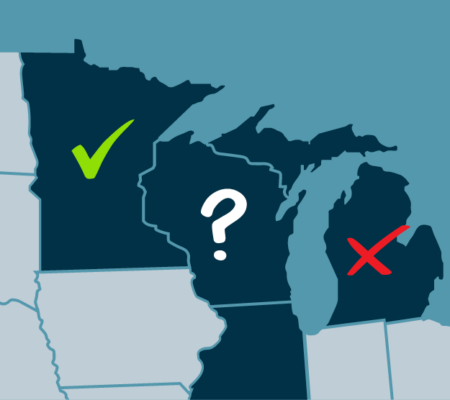Ever since Colorado legalized the recreational use of marijuana in 2012, the state laws surrounding the use of marijuana, THC and CBD have been confusing. This confusion has led many to try CBD or THC, only to be surprised to have a positive drug test and be passed over for a new job.
 NOTE: Marijuana and THC remains illegal at the federal level as a Schedule 1 controlled substance. Learn more about marijuana and THC laws in Wisconsin, Minnesota, Illinois and Michigan.
NOTE: Marijuana and THC remains illegal at the federal level as a Schedule 1 controlled substance. Learn more about marijuana and THC laws in Wisconsin, Minnesota, Illinois and Michigan.
CBD and drug screening
While the laws surrounding THC and marijuana vary by each state, CBD can be legally consumed in many states because CBD products are supposed to contain less than 0.3% percent (less than 1%) THC.
RELATED ARTICLE: THC vs. CBD vs. Marijuana: What’s the difference?
“CBD is not heavily regulated. Independent labs have performed tests on their own and found upwards of 5% THC in some CBD products,” said Dr. Corey Cronrath, medical director of occupational medicine at Marshfield Clinic Health System. “When you’re getting to those numbers and you’re consuming it orally, it will show on a drug test.”
Even if you test positive for marijuana, individuals are rarely charged by the state or federal government for marijuana consumption because results are not reported to law enforcement. However, testing positive for THC or marijuana use is typically an issue when it comes to employment, even in states that have legalized its recreational use.
Employer drug screening policies for marijuana, THC and CBD
Many states allow employers to discriminate against employees that test positive for marijuana or THC after a drug test – even if that positive test is a result of consuming CBD. This is especially true in safety-sensitive work environments such as in medical practice (doctors) or in transportation (those that drive vehicles professionally).
“When under the influence of marijuana and THC, people tend to have apathy, which is a lack of interest or caring. This is most concerning for safety sensitive jobs,” Dr. Cronrath said. “You kind of want your surgeon or the guy driving the bus to care.”
Similarly, many of these safety-sensitive jobs require a license to operate. A positive drug test can be reported to the state licensing agency for that respective profession. Many of those licensing agencies will remove an individual’s license and/or require them to undergo a substance abuse program if the individual would like to apply for the license again.
Examples of professions that may require drug testing for state licenses include:
- Health care providers
- Teachers
- Fire and Police
- Pilots
- Childcare workers
- Commercial vehicle drivers
If you have questions about your employer’s policies, please talk to your employer for more information.
Learn more about workplace health and prevention with Marshfield Clinic Health System Occupational HealthWORKS.
Learn more about Occupational HealthWORKS
Related Shine365 articles
THC vs. CBD vs. Marijuana: What’s the difference?
Accidental THC ingestion: A drug test surprise
Drug testing for a job: 4 things you need to know

